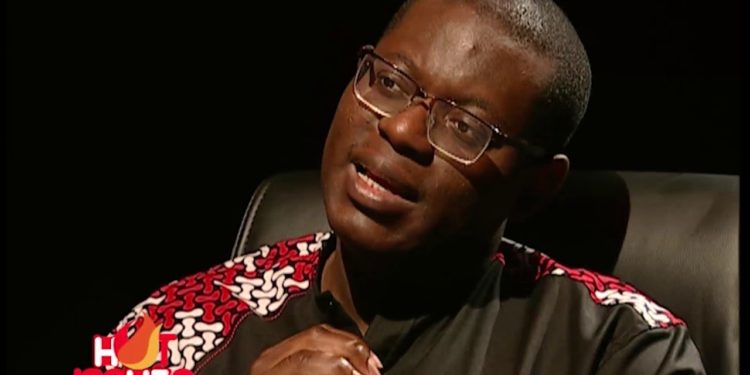Ghana’s Missing Middle: The Structural Shortfall in Domestic Investment Capital
As investors, fund managers, and policy advocates gathered under the bright chandeliers of the Kempinski Gold Coast Hotel in Accra for the Ghana Venture Capital and Private Equity Association’s (GVCA) 4th Annual Conference, a sharp voice from Washington, D.C., cut through the room via video.
Bright Simons, President of mPedigree and one of Africa’s most respected innovation thinkers, delivered a searing critique of Ghana’s capital mobilisation architecture. Speaking in a telecast interview with Norvan Acquah-Hayford of NorvanReports, recorded on the sidelines of the 2025 IMF and World Bank Spring Meetings, Simons addressed the conference’s core theme: “Catalysts for Economic Growth: Domestic Capital Mobilisation in an Evolving Investment Landscape.”
His message, broadcast to stakeholders in real time, was both sobering and thought-provoking.
“Our local investors have not shown in any way that they are less risk-averse than foreign ones,” Simons said. “When global headwinds hit, they follow the retreat.”
It was a pointed diagnosis that left the room buzzing. As Ghana struggles to reduce its dependency on volatile external borrowing, Simons argued that the domestic capital landscape itself is structurally shallow, reactive, and externally orientated, a reality that could hamper national recovery efforts in the post-debt-restructuring era.
A Mirage of Capital Depth
On the surface, Ghana’s venture capital and private equity ecosystem appears to be expanding. Assets under management (AUM) among fund managers have grown over 1,000% since 2008. But Simons warned conference attendees against mistaking volume for sovereignty.
“Most of that growth is what I call ‘spillover capital,’” he explained during the interview. “These are funds from regional or pan-African sources that include Ghana only because it fits a broader investment thesis.”
Indeed, Simons highlighted that over 97% of all capital currently managed by Ghana’s licensed fund managers comes from non-Ghanaian sources, largely regional and global portfolio strategies. Local capital, the kind denominated in cedis and rooted in national priorities, accounts for just 2.5%, with cedi-denominated funds making up a paltry 1.5% of the total.
“We’re basically outsourcing our capital decisions,” Simons said pointedly in the pre-recorded session played to delegates. “Ghana gets funding not because our businesses are understood or believed in locally, but because we fit a regional diversification model.”
A Narrow Investment Funnel
This externally driven model has also shaped where capital flows. Over 90% of PE/VC investment is funneled into a narrow band of tech-enabled services, primarily fintech, healthtech, and platform businesses that resonate with global investors. But as Simons told NorvanReports in the exclusive interview, the most critical sectors for Ghana’s inclusive growth, agro-processing, light manufacturing, logistics, and fabrication, are being left behind.
“In Ghana, the opportunity landscape is deeply variegated,” Simons explained. “But these sectors don’t fit the global VC script. So they remain unfunded and underdeveloped.”
This misalignment has implications not just for economic diversification but for job creation and resilience. It also calls into question whether Ghana can achieve the kind of structural transformation it aspires to without first securing control over its own investment channels.
A Recovery Window and a Wake-up Call
While the telecast touched on the recent signs of macroeconomic recovery, improving reserves, slowing inflation, and a tentative primary surplus, Simons urged caution. Recovery alone does not equate to transformation, he warned, especially if domestic capital continues to mirror global volatility.
“Maybe, just maybe this weak recovery can be the signal for Ghanaian investors to break the mold,” he told NorvanReports. “To invest in our story, not just track global sentiment.”
At the GVCA Conference, where policymakers and fund managers debated how to anchor growth in local systems, Simons’ intervention served as a timely provocation: Ghana’s biggest obstacle to capital mobilisation may not be scarcity, but structure, incentive, and imagination.
Time for Domestic Boldness
Simons concluded the broadcast interview with a bold call to action: Ghana must move beyond dependence on government-seeded funds and attract real domestic institutional capital, pension funds, mutual funds, corporate investment arms, that are willing to take long-term bets on the country’s productive sectors.
“Until our domestic capital pool becomes truly risk-bearing and sector-diverse, we will keep chasing the illusion of sovereignty,” he said.
As the GVCA Annual Conference closed with panel debates and pitch sessions, the replay of Simons’ remarks lingered in the room. His challenge was clear: To unlock Ghana’s economic potential, capital must not only flow, it must believe. And to believe, it must first belong.








